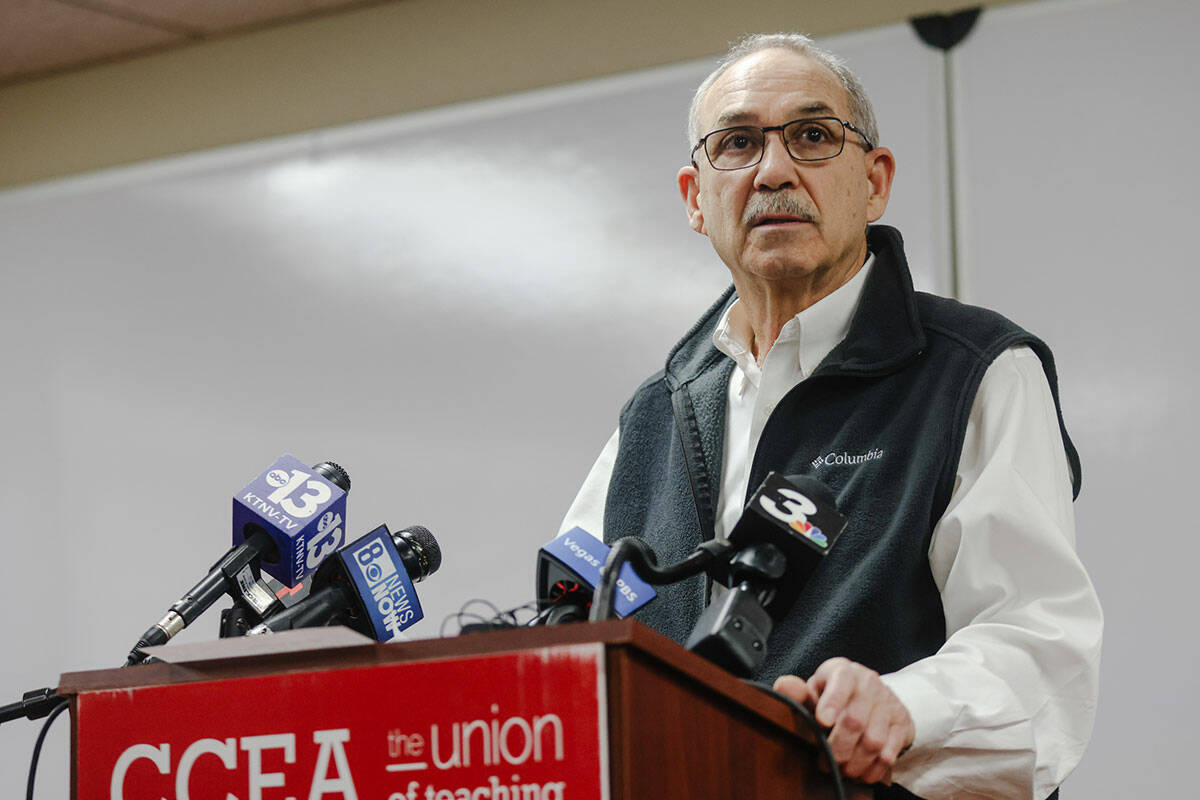CCSD alleges teachers union rejected one-time salary reevaluation based on race
The Clark County School District alleged during contentious contract talks in September that the teachers union’s top leader cited race-based reasons for rebuffing a proposal to reevaluate where employees were placed on a salary schedule.
The district claimed Clark County Education Association Executive Director John Vellardita said the union wasn’t interested in the so-called lookback proposal, saying “it would only benefit white suburban teachers.”
The claim, part of a series of complaints and counter complaints that have since been settled, was included in documents filed with the Nevada Employee-Management Relations Board.
Vellardita told the Review-Journal that the district’s description of his statement as race-based discrimination was not accurate and had been taken out of context.
A transcript provided by Vellardita from the hearing quoted him saying the proposed one-time lookback wouldn’t address the most immediate issue facing the school district: recruitment and retention, with 82 percent of teacher vacancies in the urban core.
“It doesn’t address the high vacancy areas that we need to place teachers,” Vellardita said. The union analyzed the lookback proposal and its opinion is that it would “increase the disparity between teachers’ pay in the suburban schools versus the urban core,” he said.
Most importantly, Vellardita wrote, the lookback would increase disparities in pay between white female teachers and teachers of color. About 63 percent of the district’s licensed employees — a job category that includes teachers — are white.
Though the complaint was settled, the district stood by its statement Thursday, saying in an email to the Review Journal that “Nevada and federal law forbid race-based discrimination by local government employers or unions. We presume the CCEA board will have to explain to teachers and the community if they stand by Mr. Vellardita’s statement.”
A new two-year collective bargaining agreement between the district and union — which an arbitrator approved in December — includes a new salary schedule with new hires paid based on their education and years of experience.
The lack of a one-time lookback for current employees has been a point of frustration for some longtime teachers, who say new hires will end up making more money than them.
The claim was part of a series of claims and counter-claims of unfair labor practices that the district an union filed during protracted contract negotiations — something that Vellardita said is common in contentious labor negotiations.
November hearing and order issued Wednesday
A two-day hearing was held in November on claims between the school district and teachers union. Vellardita’s comment was included in a 135-page document posted with meeting materials.
The teachers union had filed a complaint in August alleging that school principals were telling union members not to use their work email addresses to communicate about union activities without prior approval.
In a counter-complaint filed in September, the school district includes details about what was proposed during collective bargaining by both parties about a one-time lookback.
During the November hearing, the district and union settled on “most issues” except for one, and an order on the final issue was released Wednesday, the EMRB said in a Thursday email to the Review-Journal in response to an inquiry.
“If neither party files an appeal, these cases will be considered closed,” the email states.
The one remaining issue was related to incentive payments using weighted funding — whether it’s subject to mandatory collective bargaining or if it’s exempt, the order says. The board denied the teachers union’s petition and sided with the school district.
In all, there were six cases filed last year with the EMRB involving the school district and teachers union. None have been filed so far this year.
One of the cases: In July, the school district announced that it filed a petition seeking to withdraw the union’s bargaining agent status. It wasn’t one of the cases considered during the November hearing.
Contact Julie Wootton-Greener at jgreener@reviewjournal.com. Follow @julieswootton on X.























